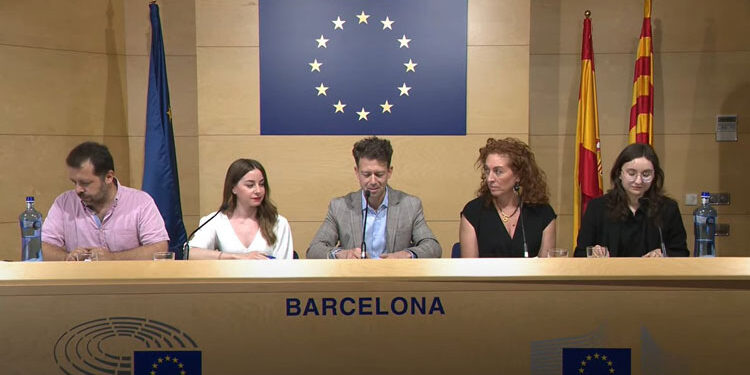Alba Córcoles
“The European Union faces the risk of becoming irrelevant on the international scene,” said College of Europe professor Nicole Dewandre, who noted that this must be “a challenge to learn how to behave in a world where we are no longer so dominant.” like before”.
Nicole Dewandre’s words were spoken at the colloquium held this week at the headquarters of the European Commission in Barcelona around the working document European strategic autonomy and electoral cycle 2024. Options regarding the US and China, prepared jointly by the Fundación Alternativas association , the Representation of the European Commission and the Barcelona Institute of International Studies (IBEI).
The event was presented by Nicole Dewandre and Manuel Szapiro, director of the Representation of the European Commission in Barcelona, who indicated at the opening of the event that “geopolitics begins at home”, and added that “we cannot be a genuine political actor with projection abroad if we do not develop our own natural resources.”
Vicente Palacio, moderator of the session and director of the document, considers that strategic autonomy is essential “for Europe to crystallize into a new, more coordinated and coherent vision of its external projection based on the construction of its own capabilities.”
Regarding the European elections, Palacio pointed out that we need “not only greater coordination, but also stronger integration in the face of the increase in Eurosceptic forces in the European Parliament.” He suggested that this could come from a centrality coalition between the great European families.
Vicente Palacio stated that “right now there is no favorable climate in Europe for the advancement of industrial policy and the Green Deal.”
Also participating in the debate were the co-authors of the document Raquel Carretero, senior analyst of Public Affairs and Regulatory Coordination; Elisa Lenker, research associate at the Center for Global Economy and Geopolitics; Águeda Parra, analyst in China and founder of #ChinaGeoTech; and Eduard Soler, professor of International Relations at the UAB and IBEI and associate researcher at the Barcelona Center for International Affairs.
Raquel Carretero pointed out that there is a divergence between European regulation and its subsequent asymmetric implementation by the Member States, “thus making its development difficult.” “Thus, we run the risk of Europe developing at two speeds,” she warned. The analyst noted that in this way, “we are being reactive rather than proactive in our response compared to the United States or China.”
Regarding our positioning against the great powers, Elisa Lenker added that “we are moving away from China and the United States in terms of competitiveness.” “Due to vulnerabilities in European value chains, our industry is not being as competitive as it could be,” Lenken explained. “We must be more autonomous to better contribute to our goals with our partners,” she said.
For her part, Águeda Parra referred to the strengths of the European Union, emphasizing that it is “one of the first powers to formulate and document this strategy.” Although she recognized that strategic autonomy is a ‘race for time’, focusing on who achieves it first, she stated that “this is a long race in which right now we are still in high school.”
Finally, Eduard Soler included the Global South in the debate, highlighting its role in international cooperation as key “to closing the circle of global governance where everyone fits.”
At the end of the debate, the improvements necessary for the next political cycle were highlighted and Carretero pointed out that “industrialization and the ecological transition are not two independent pillars, but rather they can – and must – complement and feed each other.” By prioritizing ‘competitive sustainability’ on the political agenda, “the energy transition can be an opportunity for economic development and reindustrialization,” she said.







